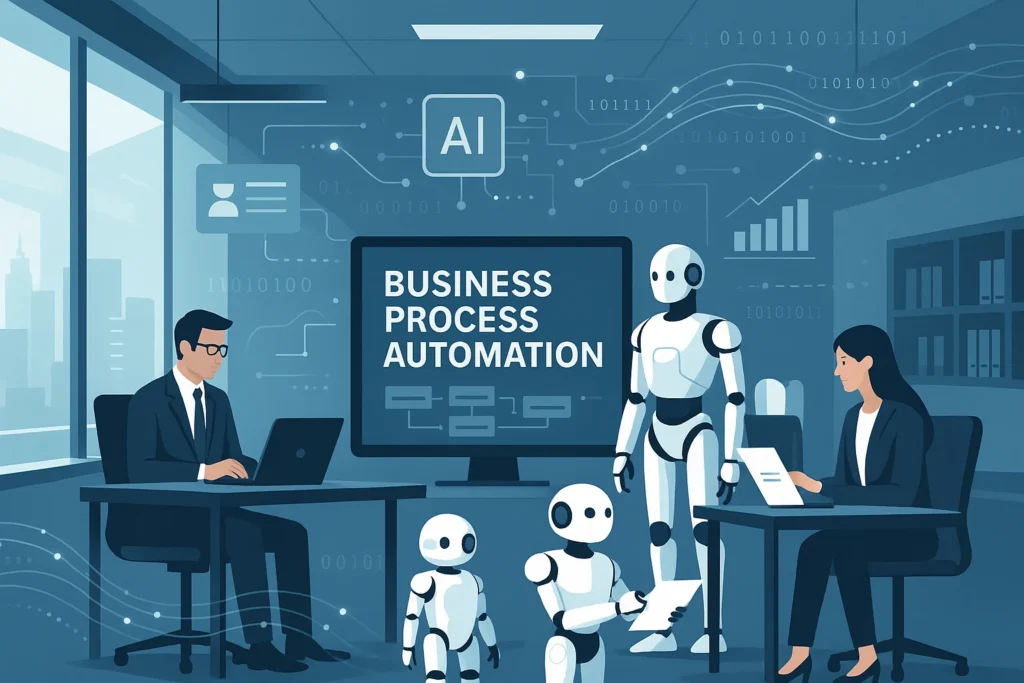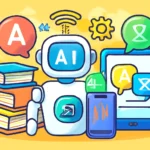Now Reading: Top 15 AI For Automating Repetitive Business Tasks
-
01
Top 15 AI For Automating Repetitive Business Tasks
Top 15 AI For Automating Repetitive Business Tasks

The average business professional spends 40% of their workday on repetitive tasks that could be automated. I discovered this the hard way when my team was drowning in manual data entry and routine processes. After implementing the best AI for automating repetitive business tasks, we’ve cut that time down by 75%. These powerful tools have transformed how we operate, and I’m excited to share my findings with you.
UiPath
UiPath stands at the forefront of AI automation tools, leveraging Robotic Process Automation (RPA) and artificial intelligence to streamline repetitive tasks. I’ve found it particularly effective for automating complex workflows across various departments including finance, HR, IT, and customer service.
Key Features:
- Built-in AI capabilities for document understanding and computer vision
- Customizable, scalable automation workflows
- Predictive analysis for process optimization
- Desktop and web automation capabilities
Pricing:
- Community Edition: Free for individuals and small teams
- Pro Plan: Starts at $420/month per user
- Enterprise Plans: Custom pricing for large-scale automation
Pros:
- Comprehensive automation capabilities with minimal coding requirements
- Excellent for complex, multi-step business processes
- Strong security and compliance features
- Robust support and extensive documentation
Cons:
- Steep learning curve for beginners
- Higher pricing compared to simpler automation tools
- Requires technical expertise for advanced implementations
- Not ideal for small businesses with limited budgets
Best For: Enterprise-level organizations looking to automate complex, repetitive tasks at scale.
Zapier
When it comes to connecting different applications without coding knowledge, Zapier is my go-to recommendation. This AI-powered workflow automation tool allows you to create “Zaps” that trigger actions in one app based on events in another.
Key Features:
- 7,000+ app integrations
- Multi-step zaps for complex workflows
- AI Path routing for intelligent automation
- No-code interface for easy setup
Pricing:
- Free: 100 tasks/month
- Starter: $19.99/month
- Professional: $69/month
Pros:
- Intuitive interface that’s accessible to non-technical users
- Vast library of pre-built templates
- Regular updates with new integrations
- Excellent for marketing and sales automation
Cons:
- Complex zaps require time to set up properly
- Limited customization compared to more advanced tools
- Free plan is quite restrictive
- Can get expensive as task volume increases
Best For: Small to medium businesses looking to automate cross-app tasks without coding knowledge.
Moveworks
Moveworks has revolutionized how I handle workplace operations through its AI-powered automation platform. It excels at autonomously managing IT, HR, and other support tasks through natural language understanding.
Key Features:
- Natural language processing for employee requests
- Integration with tools like Slack, Microsoft Teams, and ServiceNow
- Automated ticket resolution and query answering
- Self-improving responses based on user interactions
Pricing:
- Custom pricing based on organization size and needs
- Contact for quote
Pros:
- Dramatically reduces resolution time for employee support tickets
- Understands natural language queries with high accuracy
- Works seamlessly with popular business communication platforms
- Continuously improves through machine learning
Cons:
- Pricing can be prohibitive for smaller organizations
- Implementation requires significant initial setup
- Limited customization options for some integrations
- Best results require large datasets to train the AI
Best For: Medium to large organizations looking to automate internal support functions and improve employee experience.
Useful Articles:
Microsoft Power Automate
Microsoft Power Automate (formerly Flow) has been my trusted companion for automating tasks within the Microsoft ecosystem. It offers AI-driven workflow capabilities that integrate seamlessly with Microsoft’s applications.
Key Features:
- Seamless Microsoft 365 integration
- AI-powered automation suggestions
- Robotic process automation (RPA) capabilities
- Cloud and on-premise connectivity
Pricing:
- Free trial with limited access to cloud flows
- Per user plan: Starts at $15/month for cloud automation
- Per user with attended RPA: $40/month
- Enterprise plans: Custom pricing
Pros:
- Unmatched integration with Microsoft products
- AI Builder feature for intelligent automation
- Enterprise-grade security and compliance
- Both cloud and desktop automation options
Cons:
- Complex for beginners to master
- Higher pricing for advanced features
- Limited value outside the Microsoft ecosystem
- Slower execution for large workflows
Best For: Businesses heavily invested in the Microsoft ecosystem looking for native automation solutions.
Automation Anywhere
I’ve found Automation Anywhere to be an excellent cloud-native RPA platform that helps businesses automate repetitive digital tasks with minimal setup requirements.
Key Features:
- Cloud-native RPA platform
- AI-powered automation capabilities
- Extensive bot marketplace
- Attended and unattended automation options
Pricing:
- Free trial available
- Starter plan: Contact for pricing
- Advanced and enterprise plans: Custom pricing
Pros:
- No on-premises setup required
- Easy remote deployment
- Scalable for growing businesses
- Comprehensive bot marketplace for quick implementation
Cons:
- Requires technical expertise
- High cost for enterprise features
- Learning curve for advanced bot creation
- Limited customization compared to self-hosted options
Best For: Organizations seeking a cloud-based RPA solution with minimal infrastructure requirements.
Make (formerly Integromat)
Make has been my secret weapon for creating more advanced automation scenarios than what Zapier offers. This powerful workflow platform provides greater flexibility for complex automation needs.
Key Features:
- Visual workflow builder with advanced logic
- AI suggestions for workflow optimization
- 1,800+ integrations
- Real-time execution monitoring
Pricing:
- Free: 1,000 operations/month
- Core: $9/month
- Pro: $29/month
- Teams and enterprise: Custom pricing
Pros:
- More powerful than Zapier for complex workflows
- More affordable for high-volume automation
- Supports custom API calls
- Real-time workflow execution and monitoring
Cons:
- Steeper learning curve than simpler tools
- UI can feel overwhelming for beginners
- Free plan has execution limits
- Fewer pre-built templates than Zapier
Best For: Power users and businesses that need flexible, advanced automation capabilities at a reasonable price.
IFTTT (If This Then That)
For simple automation sequences, I frequently recommend IFTTT to my clients. While it doesn’t have built-in AI features, it integrates with various AI-powered tools and provides an accessible entry point to automation.
Key Features:
- Simple “if this, then that” automation logic
- Smart home and IoT device integration
- 1,000+ service connections
- Mobile-friendly interface
Pricing:
- Free: 2 applets
- Pro: $3/month
- Pro+: $12.50/month
Pros:
- Extremely easy to use
- Perfect for personal and simple business automations
- Great for smart home and IoT integration
- Affordable pricing tiers
Cons:
- Limited for complex business workflows
- Restricted customization options
- Basic logic compared to advanced platforms
- Limited support for multi-step processes
Best For: Individuals and small businesses looking for simple, affordable automation solutions.
n8n
When privacy and customization are priorities, I turn to n8n. This open-source workflow automation tool can be self-hosted, giving businesses complete control over their automation infrastructure.
Key Features:
- Open-source architecture
- Self-hosted or cloud options
- AI data categorization capabilities
- Custom workflow creation
Pricing:
- Free: Self-hosted version
- Starter (cloud): $20/month
- Pro: $50/month
Pros:
- Complete data privacy with self-hosted option
- Highly customizable workflows
- No vendor lock-in
- Active community and regular updates
Cons:
- Technical setup required for self-hosting
- Smaller marketplace of pre-built integrations
- Less intuitive for non-technical users
- Limited support compared to commercial options
Best For: Privacy-conscious organizations and technical teams that need customizable automation solutions.
Useful Articles:
ChatGPT for Business
I’ve been amazed by how ChatGPT has transformed business automation. It stands out for automating repetitive communications and content creation tasks, allowing teams to focus on strategic work.
Key Features:
- Natural language processing for text generation
- Automated customer inquiry responses
- Report and email drafting capabilities
- Content creation assistance
Pricing:
- Free: Basic access
- ChatGPT Plus: $20/month
- Enterprise: Custom pricing
Pros:
- Versatile application across multiple business functions
- Reduces time spent on routine writing tasks
- Continuously improving capabilities
- Easy integration with various platforms
Cons:
- May require human oversight for accuracy
- Limited by training data cutoff
- Can struggle with highly specialized industry terminology
- Potential for generic outputs without proper prompting
Best For: Businesses looking to automate content creation, customer communications, and routine writing tasks.
Thunderbit
Thunderbit has impressed me with its focus on drag-and-drop functionality for AI automation. It’s perfect for non-technical users who want to automate complex processes without writing code.
Key Features:
- Intuitive drag-and-drop interface
- Multi-system data analysis
- Rule-based action triggering
- Workflow optimization capabilities
Pricing:
- Contact for pricing details
Pros:
- Empowers non-technical users to create complex workflows
- No coding knowledge required
- Visual interface makes automation accessible
- Optimizes intricate workflows for productivity
Cons:
- Limited public pricing information
- Newer platform with fewer reviews
- May lack some advanced features of established tools
- Limited integration library compared to larger platforms
Best For: Non-technical teams looking to implement AI automation without coding expertise.
Microsoft Copilot
Microsoft Copilot has transformed how I work with Microsoft 365 applications. This AI-powered assistant boosts productivity by automating routine tasks within familiar Microsoft tools.
Key Features:
- Integration with Microsoft 365 applications
- Content generation for emails, reports, and presentations
- Data analysis assistance in Excel
- Meeting summaries and action item tracking
Pricing:
- Included with certain Microsoft 365 subscriptions
- Standalone: $30/user/month (approximate)
Pros:
- Seamless integration with Microsoft ecosystem
- Reduces time spent on routine document creation
- Improves data analysis efficiency
- Enhances meeting productivity
Cons:
- Limited to Microsoft applications
- Requires Microsoft 365 subscription for full functionality
- Still evolving with occasional limitations
- Learning curve to use effectively
Best For: Organizations heavily invested in Microsoft 365 looking to enhance productivity within those tools.
Salesforce Einstein
Salesforce Einstein has been a game-changer for my sales automation processes. This AI-powered assistant brings automation to CRM tasks, helping sales teams focus on relationship building rather than administrative work.
Key Features:
- AI-powered CRM automation
- Predictive lead scoring and forecasting
- Automated data entry and enrichment
- Customer interaction analysis
Pricing:
- Included in some Salesforce editions
- Add-on pricing varies by feature
- Contact for specific pricing
Pros:
- Native integration with Salesforce CRM
- Reduces manual data entry for sales teams
- Improves lead prioritization and conversion
- Provides actionable insights from customer data
Cons:
- Requires Salesforce ecosystem
- Can be expensive for small businesses
- Complex implementation for full value
- Requires clean data for optimal performance
Best For: Sales teams using Salesforce CRM who want to automate repetitive tasks and gain AI-powered insights.
Notion AI
I’ve found Notion AI to be an excellent tool for automating document creation and knowledge management. It brings AI assistance to note-taking, drafting, and collaborative workspaces.
Key Features:
- AI-powered writing assistance
- Document summarization
- Meeting note generation
- Knowledge base organization
Pricing:
- Notion AI add-on: $8/month per member (with Notion subscription)
- Team plans start at $8/user/month plus AI add-on
Pros:
- Enhances existing Notion workspaces
- Improves team collaboration and knowledge sharing
- Intuitive interface for easy adoption
- Reduces time spent on documentation
Cons:
- Requires Notion subscription
- Some features overlap with standalone AI writing tools
- Limited to text-based automation
- Still evolving with occasional limitations
Best For: Teams already using Notion who want to add AI capabilities to their knowledge management and documentation processes.
Useful Articles:
WorkFusion
WorkFusion has been invaluable for my data-heavy automation needs. This platform merges AI and RPA to automate complex, data-intensive processes with impressive accuracy.
Key Features:
- AI-powered document processing
- Intelligent automation for complex workflows
- Pre-built automation templates for finance and banking
- Machine learning capabilities for continuous improvement
Pricing:
- Contact for custom pricing
Pros:
- Excellent for document-heavy industries like finance
- Reduces processing time for complex workflows
- Continuously improves through machine learning
- Handles unstructured data effectively
Cons:
- Enterprise-focused pricing
- Complex implementation process
- Requires technical expertise
- Significant initial investment
Best For: Large organizations in regulated industries with complex, document-heavy processes.
Tidio
For customer service automation, I’ve had great success with Tidio. This AI-powered platform helps businesses automate customer interactions across multiple channels.
Key Features:
- AI chatbot builder
- Multichannel communication support
- Mobile app for on-the-go management
- Customer behavior tracking
Pricing:
- Free: Basic chatbot features
- Communicator: $29/month
- Chatbots: Additional $39/month
Pros:
- Affordable entry point for small businesses
- Easy-to-use chatbot builder
- Multichannel support (chat, email, social media)
- Mobile app for remote management
Cons:
- Limited AI capabilities compared to enterprise solutions
- May not scale well for very large businesses
- Limited customization for complex scenarios
- Some advanced features require additional payment
Best For: Small to medium businesses looking to automate customer service interactions with an affordable, easy-to-implement solution.
Comparison Table
| Tool | Best For | Pricing Starts At | Key Strength | Main Limitation |
|---|---|---|---|---|
| UiPath | Enterprise automation | $420/month/user | Comprehensive RPA capabilities | High cost, steep learning curve |
| Zapier | Cross-app workflows | Free (limited), $19.99/month | 7,000+ integrations | Limited customization |
| Moveworks | IT & HR support | Custom pricing | Natural language understanding | High implementation cost |
| Microsoft Power Automate | Microsoft ecosystem | $15/month | Microsoft 365 integration | Limited value outside Microsoft |
| Automation Anywhere | Cloud RPA | Custom pricing | Cloud-native deployment | Technical expertise required |
| Make (Integromat) | Advanced workflows | Free (limited), $9/month | Powerful logic capabilities | Complex for beginners |
| IFTTT | Simple automations | Free (limited), $3/month | Ease of use | Limited for complex business needs |
| n8n | Privacy-focused teams | Free (self-hosted), $20/month | Data privacy control | Technical setup required |
| ChatGPT for Business | Content automation | Free (limited), $20/month | Versatile text generation | Requires human oversight |
| Thunderbit | No-code automation | Custom pricing | Drag-and-drop simplicity | Newer platform, fewer integrations |
| Microsoft Copilot | Microsoft 365 users | ~$30/month | Office integration | Limited to Microsoft apps |
| Salesforce Einstein | Sales teams | Varies with Salesforce | CRM automation | Requires Salesforce ecosystem |
| Notion AI | Knowledge management | $8/month (add-on) | Document assistance | Requires Notion subscription |
| WorkFusion | Data-heavy industries | Custom pricing | Complex document processing | Enterprise-focused pricing |
| Tidio | Customer service | Free (limited), $29/month | Affordable chatbot solution | Limited scalability |
Finding the best AI for automating repetitive business tasks doesn’t have to be overwhelming. I’ve found that the right solution depends on your specific needs, technical capabilities, and budget. Whether you’re looking for comprehensive RPA platforms like UiPath, simple connectors like Zapier, or specialized tools for specific departments, there’s an AI automation solution that can transform your workflow. Start small, measure the results, and expand your automation strategy as you see the benefits unfold.





















